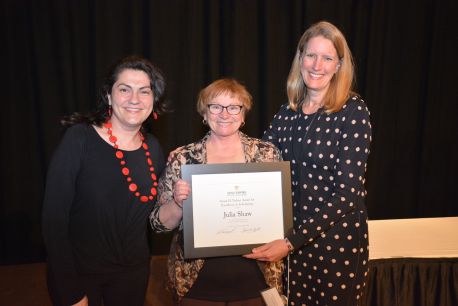April 2, 2016
Julia Penn Shaw Receives the Susan H. Turben Award in Excellence in Scholarship

(Saratoga Springs, N.Y. – April 5, 2016) Julia (Julie) Penn Shaw is the 2016 recipient of the Susan H. Turben Award for Excellence in Scholarship. She is an associate professor and the academic coordinator for Human Development at SUNY Empire State College’s Center for Distance Learning.
Shaw was presented with her award at the Empire State College Foundation awards dinner during the annual All College Conference held at the end of March in Saratoga Springs, N.Y.
President Merodie Hancock said, “Congratulations. I join the cabinet, the (Empire State College) foundation board and the rest of your colleagues in extending my thanks and appreciation for your extraordinary efforts on behalf of our students. Thanks also to all those who support the foundation’s mission and programs. This ceremony itself – and many other programs – would not be possible without your support.”
Roxana Toma, last year’s recipient, said, “This year’s recipient has been at the college since 2003, during which time she has become known as an inspiring colleague and personal mentor to other faculty members. She is generous in sharing her knowledge of the field with students and a gracious and creative collaborator with her colleagues. Her own work is noted for its originality and significant contribution to the field of Human Development and has been recognized internally through a Scholars Across the College award."
Colleagues hail the recipient’s work as exciting and ambitious, with an energetic approach to learning and scholarship. They say her passion for the subject matter is contagious and she has found myriad ways in which to apply her expertise within the academic arena.
She serves on the editorial boards of two professional publications, in addition to a National Science Foundation Fellowship review board. She has spoken at numerous professional conferences and industry presentations and presents prolifically in her field.
As a lifespan developmentalist, Shaw’s work focuses on the integration of life development, psychology and learning, with a focus on how each human makes meaning as she or he develops and how that meaning becomes more complex with age.
Shaw has investigated, presented and published research on construction of personal meaning by educated adolescent and adults. Two aspects of Shaw’s work are particularly relevant to her field. First, her methodology is new, allowing individuals to construct their own patterns for meaning using symbol/events of their own creation. Second, the results are germane, indicating that even when given freedom to organize meaning, educated adults only use four patterns for construction, which become more complexly intercoordinated with age. Shaw’s work contributes to research in lifespan development, learning theory, educational practices and the study of narrative structure.
About the Susan H. Turben Award for Excellence in Scholarship
The Susan H. Turben Award for Excellence in Scholarship recognizes and honors a faculty member or professional employee for distinguished scholarly activity that is widely recognized and significantly enhances the academic reputation of Empire State College.
About SUNY Empire State College
Empire State College, the nontraditional, open college of the SUNY system, educates more than 20,000 students worldwide at eight international sites, more than 35 locations in the state of New York, online, as well as face to face and through a blend of both, at the associate, bachelor’s and master’s levels.
The average age of an undergraduate student at the college is 35 and graduate students’ average age is 40.
Most Empire State College students are working adults. Many are raising families and meeting civic commitments in the communities where they live, while studying part time.
In addition to awarding credit for prior college-level learning, the college pairs each undergraduate student with a faculty mentor who supports that student throughout his or her college career.
Working with their mentors, students design an individual degree program and engage in guided independent study and course work onsite, online, or through a combination of both, which provides the flexibility for students to choose where, when and how to learn.
Students have the opportunity to enroll five times during the year.
The college’s 73,000 alumni are active in their communities as entrepreneurs, politicians, business professionals, artists, nonprofit agency employees, teachers, veterans and active military, union members and more.
The college was first established in 1971 by the SUNY Board of Trustees with the encouragement of the late Ernest L. Boyer, chancellor of the SUNY system from 1970 to 1977.
Boyer also served as United States commissioner of education during the administration of President Jimmy Carter and then as president of the Carnegie Foundation for the Advancement of Teaching.
More information about the college is available at www.esc.edu .
Contact: Hope Ferguson, Senior Writer
518 587-2100, ext. 2509 Hope.Ferguson@esc.edu